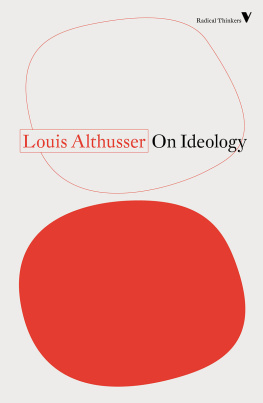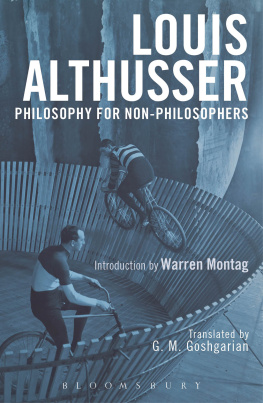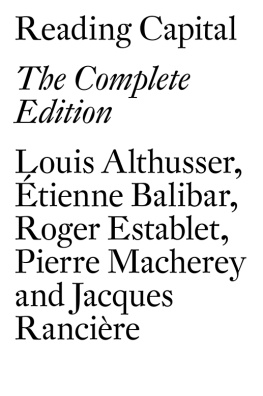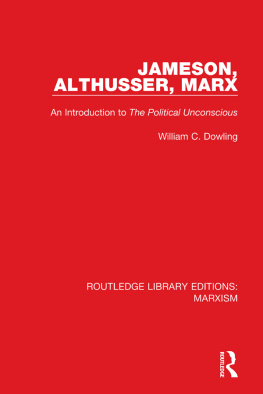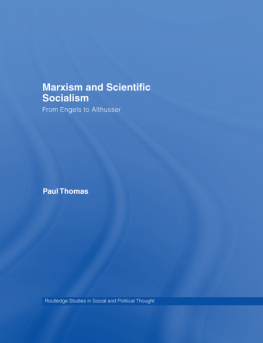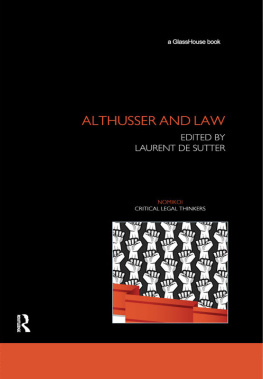Foreword to the Italian Edition
1. This edition of Reading Capital differs from the first edition (Lire le Capital, Vols. I and II, Maspero, Paris 1965) in several respects.
On the one hand, it is an abridged edition, since we have omitted a number of important contributions (the papers of Rancire, Macherey and Establet) in order to allow the book to be published in a smaller format.
On the other, it is a revised and corrected edition, and therefore in part a new edition: several pages, notably in Balibars text, were published in French for the first time in this edition.
However, the corrections (cuts and additions) we have made to the original text concern neither the terminology nor the categories and concepts used, nor their internal relations, nor in consequence the general interpretation of Marxs work that we have given.
This edition of Reading Capital, although different from the first, and abridged and improved, therefore strictly reproduces and represents the theoretical positions of the original text.
2. This last comment was a necessary one. Indeed, out of respect to the reader and simple honesty, we have maintained an integral respect for the terminology and the philosophical positions of the first edition, although we should now find it indispensable to correct them at two particular points. Despite the precautions we took to distinguish ourselves from the structuralist ideology (we said very clearly that the combination to be found in Marx has nothing to do with a combinatory), despite the decisive intervention of categories foreign to structuralism (determination in the last instance, domination, overdetermination, production process, etc.), the terminology we employed was too close in many respects to the structuralist terminology not to give rise to an ambiguity. With a very few exceptions (some very perceptive critics have made the distinction), our interpretation of Marx has generally been recognized and judged, in homage to the current fashion, as structuralist.
We believe that despite the terminological ambiguity, the profound tendency of our texts was not attached to the structuralist ideology. It is our hope that the reader will be able to bear this claim in mind, to verify it and to subscribe to it.
On the other hand, we now have every reason to think that, despite all the sharpening it received, one of the theses I advanced as to the nature of philosophy did express a certain theoreticist tendency. More precisely, the definition of philosophy as a theory of theoretical practice (given in For Marx and again in Part One of Reading Capital) is unilateral and therefore inaccurate. In this case, it is not merely a question of terminological ambiguity, but one of an error in the conception itself. To define philosophy in a unilateral way as the Theory of theoretical practices (and in consequence as a Theory of the differences between the practices) is a formulation that could not help but induce either speculative or positivist theoretical effects and echoes.
The consequences of this error in the definition of philosophy can be recognized and delimited at a few particular points in Part One of Reading Capital. But with the exception of a few minor details, these consequences do not affect the analysis that we have made of Capital (The Object of Capital and Balibars paper).
In a forthcoming series of studies, we shall have the opportunity of rectifying the terminology and correcting the definition of philosophy.
Louis Althusser
Note to the English Edition
For the conjuncture in which this text was prepared (1965), for its character as a theoretico-ideological intervention in that conjuncture, and for its theoretical limits, lacunae and errors, the reader should refer to the presentation, To My English Readers, in For Marx.
Louis Althusser, 17 May 1970
To the citizen Maurice La Chtre
Dear Citizen,
I applaud your idea of publishing the translation of Das Kapital as a serial. In this form the book will be more accessible to the working-class, a consideration which to me outweighs everything else.
This is the good side of your suggestion, but here is the reverse of the medal: the method of analysis which I have employed, and which had not previously been applied to economic subjects, makes the reading of the first chapters rather arduous, and it is to be feared that the French public, always impatient to come to a conclusion, eager to know the connection between general principles and the immediate questions that have aroused their passions, may be disheartened because they will be unable to move on at once.
This is a disadvantage I am powerless to overcome, unless it be by forewarning and forearming those readers who zealously seek the truth. There is no royal road to science, and only those who do not dread the fatiguing climb of its steep paths have a chance of gaining its luminous summits.
Believe me,
dear citizen
Your devoted,
KARL MARX
London, 18 March 1872.
Part I
From Capital to Marxs Philosophy
Louis Althusser
The following papers were delivered in the course of a seminar on Capital held at the cole Normale Suprieure early in 1965. They bear the mark of these circumstances: not only in their construction, their rhythm, their didactic or oral style, but also and above all in their discrepancies, the repetitions, hesitations and uncertain steps in their investigations. We could, of course, have gone over them at our leisure, corrected them one against the other, reduced the margin of variation between them, unified their terminology, their hypotheses and their conclusions to the best of our ability, and set out their contents in the systematic framework of a single discourse in other words, we could have tried to make a finished work out of them. But rather than pretending they are what they should have been, we prefer to present them for what they are: precisely, incomplete texts, the mere beginnings of a reading.
Of course, we have all read, and all do read Capital. For almost a century, we have been able to read it every day, transparently, in the dramas and dreams of our history, in its disputes and conflicts, in the defeats and victories of the workers movement which is our only hope and our destiny. Since we came into the world, we have read Capital constantly in the writings and speeches of those who have read it for us, well or ill, both the dead and the living, Engels, Kautsky, Plekhanov, Lenin, Rosa Luxemburg, Trotsky, Stalin, Gramsci, the leaders of the workers organizations, their supporters and opponents: philosophers, economists, politicians. We have read bits of it, the fragments which the conjuncture had selected for us. We have even all, more or less, read Volume One, from commodities to the expropriation of the expropriators.
But some day it is essential to read Capital to the letter. To read the text itself, complete, all four volumes, line by line, to return ten times to the first chapters, or to the schemes of simple reproduction and reproduction on an enlarged scale, before coming down from the arid table-lands and plateaus of Volume Two into the promised land of profit, interest and rent. And it is essential to read Capital not only in its French translation (even Volume One in Roys translation, which Marx revised, or rather, rewrote), but also in the German original, at least for the fundamental theoretical chapters and all the passages where Marxs key concepts come to the surface.



